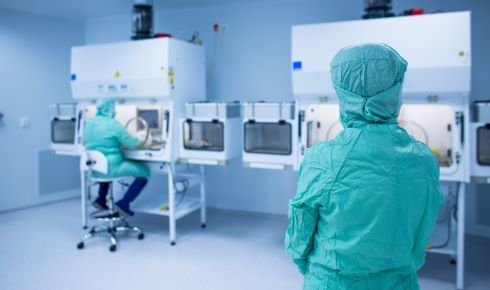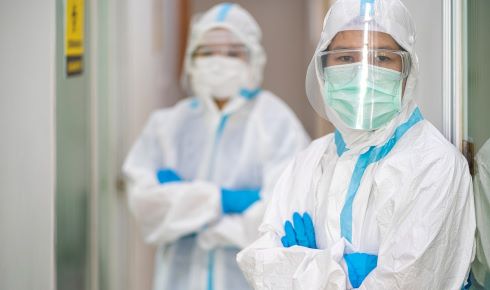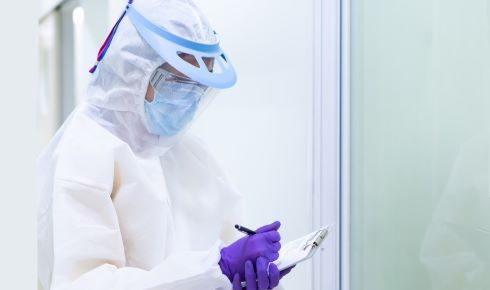Risky business

6th September 2024
Amid growing concerns about biorisk and biosecurity, the RSB has launched a new professional register to help biologists and employers prove and improve competency in this important area of bioscience
The rapid worldwide rise in the number of laboratories handling dangerous pathogens in recent years has bought with it concerns about a lack of oversight and insufficient biosafety and biosecurity measures¹. The Global BioLabs Report 2023 noted not only an increase in the number of labs and countries now housing Biosafety Level 4 (BSL4) maximum-containment labs, but also that three-quarters were situated in urbanised areas, exacerbating the potential effects of any accidental release of pathogens or other hazardous materials¹. A recent boom in this line of research means that around half of all the BSL4 labs for which dates of establishment are available only began operating in the last 10 years² and many are in countries that score poorly on biorisk management.
The situation for biorisk training in the UK isn’t much better. The most recent Global Health Security Index report gave the UK a score of zero (out of one) in biosecurity and biosafety training, stating that in both these areas, the UK does not use “a standardised, required approach, such as through a common curriculum… for personnel working in facilities housing or working with especially 26 dangerous pathogens, toxins, or biological materials”³. As Professor Bryan Charleston, director of The Pirbright Institute, explained at the recent launch of the RSB’s new Biorisk Professional Registration Scheme (BPRS), a new professional register for biologists: “We have a shortage of people with formal training working in high biological containment.”
It was such concerns that led to the development of the BPRS. The register has been created to raise the standards and consistency of biorisk management across the bioeconomy sector, ultimately improving the protection of people, animals, plants and the environment to the benefit of both organisations and wider society.
 The UK has a shortage of people with formal training working in high biological containment
The UK has a shortage of people with formal training working in high biological containment
The register enables RSB members to demonstrate defined, recognised and maintained skills to employers or clients, while also providing decision-makers with a recognised benchmark of competency that can be verified through a searchable online register. The programme also encourages practitioners to develop their professional skills and share learning as their careers progress.
Knowledge Framework
Developed over several years, with contributions from biorisk experts and sector leaders, the register is suitable for anyone who provides advice, support or oversight on biological risk, such as biological safety or risk officers, advisers or managers. It will benefit a wide range of organisations – including biotechnology and pharmaceutical operations, universities, research institutes, and government and NHS pathology laboratories – and within a variety of contexts, from animal facilities to diagnostic testing labs.
The register defines a framework of the key technical knowledge and essential skills required for biorisk professionals, so they can successfully provide reliable advice and support to their stakeholders for all levels and types of biocontainment. It also aims to foster international equivalence and recognition of biorisk management practice, and enhance the professional status of biorisk advisers. The result will be biorisk professionals who, through appropriate assessment, have evidentially and objectively demonstrated the defined core knowledge and essential skills, along with a public database for verification of registration status.
The BPRS has been developed by the RSB in partnership with the Biorisk Strategic Leadership Group (BSLG), established in 2017 and coordinated by The Pirbright Institute as part of the Health and Safety Executive’s Sector Plan for the Bioeconomy. The BSLG’s members include the UK’s main high-containment facilities, several leading UK universities and research institutes, NHS England and industry partners.
Structure and consistency
Dr Surrinder Johal, director of safety at Imperial College, says she is delighted and excited by the scheme. “We have been having great challenges in trying to recruit biosafety officers for the last 10 to 20 years. This new scheme will enable us to expand that pool, and provide more structure and consistency for that sort of expertise.”
 Both levels of registry will cover 12 vital elements of biorisk management practice
Both levels of registry will cover 12 vital elements of biorisk management practice
Two levels of registry are available. The Registered Biorisk Adviser (RBA) pathway is intended for new practitioners, those who require a basic level of recognised competence or those supporting simple work of lesser inherent risk at low biocontainment levels. The higher-level Registered Biorisk Specialist (RBS) pathway is aimed at those developing a career as a biorisk adviser or specialist, needing a higher level of recognised competence or supporting more complex work of greater inherent risk at high biocontainment.
The RBA is a prerequisite of RBS status, helping to build a career pathway for practitioners. For both levels, there is a key knowledge component and an essential skills component, with the former evidenced largely from training and the latter demonstrated mainly by a portfolio of evidence. Continuing professional development (CPD) is a mandatory part of maintaining professional registration. To retain BPRS registration, registrants must pass the annual requirements for RSB CPD every year.
Both the RBA and RBS are built around 12 elements of biorisk management practice: management systems, hazard identification, risk assessment, containment and control, genetic modification, waste management, transport, competence and training, incident management, monitoring, engagement and impact, and ethics and sustainability.
Ultimately, the aim is to help create more biorisk professionals with comprehensive all-round capabilities who are able to respond flexibly to situations and are well equipped to progress their careers as the risks involved in bioscience change over time – a positive step to address the gap in biorisk competency in the UK and beyond.
Find out more about BPRS registration or contact the Registers team.
The RSB also manages other professional registers for biologists to demonstrate their expertise and skills:
• Registered Science Technician
• Registered Scientist
• Chartered Biologist
• Chartered Scientist
• Chartered Science Teacher
• Qualified Person (medical products)
• UK Register of Toxicologists
• International Register of Fetal Morphologists
• Plant Health Professional Register
• External Examiner Database
References
1) King’s College London Global BioLabs Report 2023.
2) Lentzos, F. et al. The urgent need for an overhaul of global biorisk management. CTC Sentinel 15(4) (2022).
3) Global Health Security Index 2021 – United Kingdom.
Find out more about BPRS registration or contact the Registers team.


